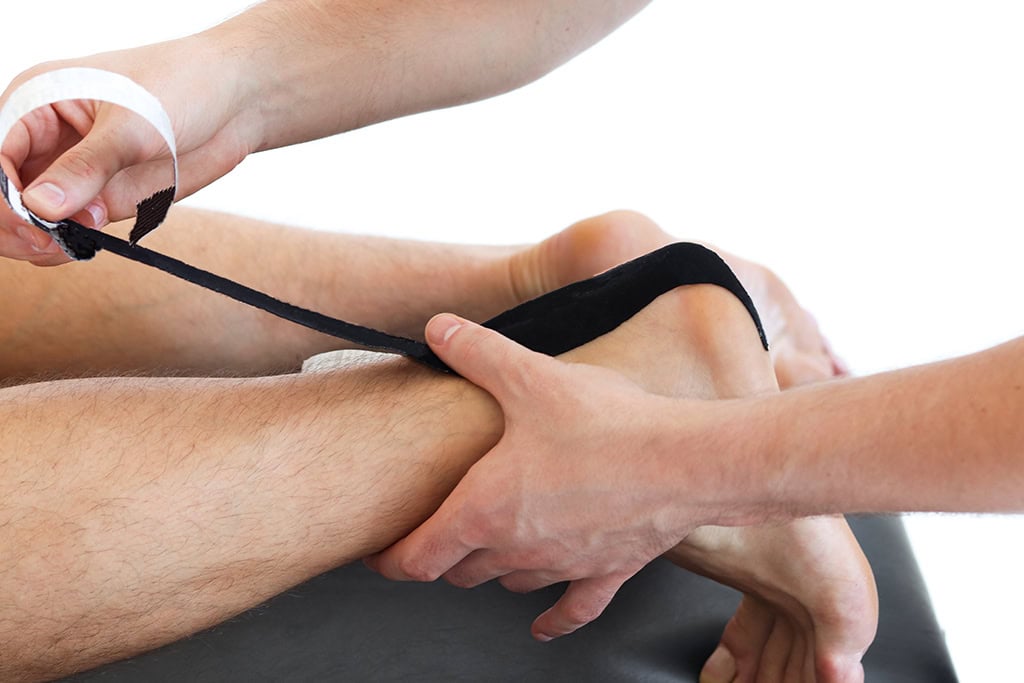Achilles Tendonitis
What Is Achilles Tendonitis?
Achilles tendonitis is inflammation of the Achilles tendon, the thick band of tissue that connects your calf muscles to your heel bone. It’s a common overuse injury, especially in active adults, runners, or those who suddenly increase their physical activity. When irritated, the tendon becomes swollen and painful, especially during walking, running, or climbing stairs.
At Vale Foot and Ankle, we help patients recover from Achilles tendonitis with targeted care to reduce pain, restore mobility, and prevent long-term damage.

Causes and Risk Factors Of Achilles Tendonitis
Achilles tendonitis typically develops from repetitive stress. The condition can affect anyone but is most common in people who:
- Suddenly increase their activity level or workout intensity
- Don’t stretch or warm up properly before exercise
- Wear unsupportive or worn-out footwear
- Have tight calf muscles or limited ankle flexibility
- Have flat feet or other biomechanical foot issues
- Are middle-aged or older and participate in high-impact sports
If left untreated tendonitis can worsen over time and may lead to Achilles tendinosis (degeneration) or even tendon rupture.
Symptoms of Achilles Tendonitis
It usually starts gradually and gets worse if left untreated. Common symptoms are:
- Pain or stiffness at the back of the heel or lower calf
- Swelling around the Achilles tendon
- Discomfort that gets worse with activity and better with rest
- Tenderness when pressed on the tendon
- Limited ankle range of motion especially when flexing the foot up
- A warm or thick feeling in the tendon area
In some cases, a lump or nodule may develop on the tendon due to scar tissue buildup.
Get Back to Pain-Free Movement
If you’re feeling pain or stiffness in your Achilles tendon, don’t wait for it to get worse. Contact us at Vale Foot and Ankle today and take the first step toward long-term relief and a healthier stride.
Types of Achilles Tendonitis
There are two:
- Non-insertional Achilles tendonitis: Inflammation in the middle of the tendon, is more common in younger active people.
- Insertional Achilles tendonitis: Affects the lower part of the tendon where it attaches to the heel bone, often with calcification or bone spurs. These are the heel spurs that can be part of the problem and removing them can be part of the solution.


Expert Achilles Tendonitis Diagnosis and Treatment from a Surgical Practice
At Vale Foot and Ankle, we diagnose and treat Achilles tendonitis at all stages, from early inflammation to chronic degeneration and surgical repair. As a foot and ankle surgical practice, we offer both non-surgical care and advanced surgical solutions when needed. Whether you’re an athlete, a weekend walker, or just dealing with persistent heel pain, we want to get you back to function, mobility, and comfort with the right level of intervention for your condition.
Achilles Tendonitis Diagnosis
At Vale Foot and Ankle, we start with a physical exam and a chat about your symptoms, daily activities, and any recent changes in exercise or footwear. We’ll check for tenderness, swelling, and how well your ankle moves. In some cases, we may use imaging like ultrasound or MRI to assess the extent of inflammation, tissue thickening or any signs of degeneration, or tearing of the Achilles tendon.

Treatment Options For Achilles Tendonitis
Most cases of Achilles tendonitis can be treated non-surgically. At Vale Foot and Ankle we will build your care plan around your symptoms, goals and activity level to get you back to full function as quickly as possible with minimal downtime.
Conservative Treatments
- Rest and activity modification – Reducing strain on the tendon by limiting or adjusting physical activity
- Ice therapy – Applying ice several times a day to reduce swelling and discomfort
- Stretching and strengthening exercises – Focused on the calf muscles and Achilles tendon to improve flexibility and reduce tension
- Supportive footwear and orthotics – Shoes with heel lifts or custom inserts to reduce tendon strain
- Physical therapy – Tailored programs to address biomechanics, build strength and promote healing
- Anti-inflammatory medication – NSAIDs can help control inflammation and pain during flare ups
Advanced Therapies
For more persistent cases we may recommend:
- Immobilization – A walking boot or brace to rest the tendon
- Shockwave therapy – A non invasive treatment that stimulates healing in chronic tendonitis. Available soon
- Platelet-rich plasma (PRP) injections – May be considered for chronic tendon damage that hasn’t responded to other therapies
- Stem cell injections – A regenerative treatment that promotes tendon repair and healing in chronic Achilles tendon damage
When Surgery Is Considered
Surgery is rarely needed for Achilles tendonitis but may be considered if:
- Conservative treatments fail after several months
- There is severe tendon thickening, degeneration or a partial tear
- Bone spurs are contributing to insertional tendonitis
Surgical options may include removing damaged tendon tissue, repairing tears or removing calcified bone at the heel. Recovery varies but typically involves a period of rest, physical therapy and a gradual return to activity.
Preventing Recurrence
- Stretch and strengthen your calves regularly
- Avoid sudden increases in workout intensity or duration
- Wear shoes with proper heel and arch support
- Warm up before and cool down after exercise
- Use orthotics if you have flat feet or biomechanical issues
Why Choose Vale Foot and Ankle?
At Vale Foot and Ankle we specialise in diagnosing and treating tendon injuries with personalized, evidence based care. Whether you’re an athlete, a weekend walker or just trying to stay active without pain our goal is to help you recover quickly and reduce your risk of future injury.
Latest Posts

Is Bunion Surgery Painful? What to Expect Before, During, and After Surgery
Bunion surgery can be painful during recovery, but each individual’s pain can look very different

Stem Cell Injections for Plantar Fasciitis: What to Know Before You Decide
Plantar fasciitis is one condition that tends to disappear into the background, until it doesn’t.

Does Insurance Cover a Podiatrist Visit in Connecticut?
If you are dealing with foot pain or an ankle issue, the last thing you
